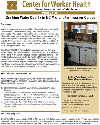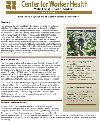Using "Policy Briefs" to Present Scientific Results of CBPR: Farmworkers in North Carolina
- PMID: 28736406
- PMCID: PMC6262882
- DOI: 10.1353/cpr.2017.0018
Using "Policy Briefs" to Present Scientific Results of CBPR: Farmworkers in North Carolina
Abstract
Background: Using scientific results to inform policy that improves health and well-being of vulnerable community members is essential to community-based participatory research (CBPR).
Objectives: We describe "policy briefs," a mechanism developed to apply the results of CBPR projects with migrant and seasonal farmworkers to policy changes.
Lessons learned: Policy briefs are two-page summaries of published research that address a single policy issue using language and graphics to make the science accessible to diverse audiences. Policy brief topics are selected by community advocates, based on collaborative research, and address a specific policy or regulation. Development is an iterative process of discussion with community representatives. Briefs have been used to provide information to advocates, state and national policymakers, and the public.
Conclusions: Disseminating CBPR results to address policy is needed. Collaborating with community partners to produce policy briefs ensures that information about concerns and struggles reflects their priorities.
Figures





References
-
- Quandt SA, Arcury TA. Alcohol consumption and risk for dependence among male Latino migrant farmworkers compared to Latino nonfarmworkers in North Carolina In: Leong F, Eggerth D, Chang D, Flynn M, Ford K, Martinez R, editors. Occupational health disparities among racial and ethnic minorities: formulating research needs and directions. Washington, DC: APA Press;2016. Forthcoming. - PMC - PubMed
-
- Arcury TA, Quandt SA. Community-based participatory research and occupational health disparities: pesticide exposure among immigrant farmworkers In: Leong F, Eggerth D, Chang D, Flynn M, Ford K, Martinez R, editors. Occupational health disparities among racial and ethnic minorities: formulating research needs and directions. Washington, DC: APA Press;2016. Forthcoming.
-
- Minkler M, Wallerstein N. Community-based Participatory Research for Health. San Francisco, CA: Jossey-Bass; 2003.
-
- Chen PG, Diaz N, Lucas G, Rosenthal MS. Dissemination of results in community-based participatory research. Am J Prev Med. 2010; 39: 372–78. - PubMed
MeSH terms
Grants and funding
LinkOut - more resources
Full Text Sources
Other Literature Sources
